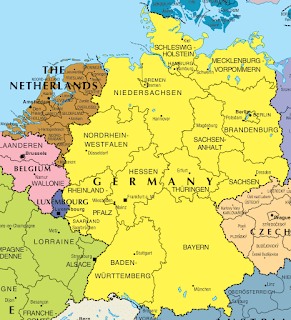Many German words begin with the alveopalatal fricative. They are often followed by a consonant. In Dutch, however, these words often begin with an alveolar fricative. Here is a list for comparison with the German word on the left and the Dutch on the right:
- Schlaf slaap (sleep)
- Schlange slang (snake)
- schlecht slecht (bad)
- Schloẞ slot (castle)
- Schlüssel sleutel (key)
- schmal smal (narrow)
- Schmied smid (smith)
- Schnauze snuit (snout)
- schnell snel (fast)
- Schnur snoer (string)
German has many words which begin with an alveopalatal fricative and consonant. In Dutch they often begin with an alveolar fricative. This pattern can also be seen in the other Germanic languages. The German word for snow, Schnee, is sneeuw in Dutch, snö in Swedish sne in Danish and snø in Norwegian. However, due to the similarity of German and Dutch, these two languages are exemplary for illustrating palatalization in German.

No comments:
Post a Comment